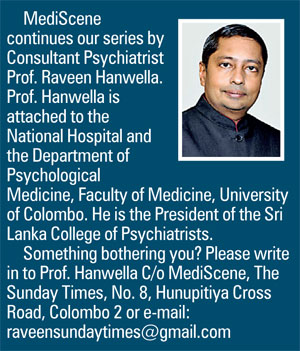Don’t we all wish for wisdom?
In the movie Camelot, based on Lerner and Loewe’s stage play, Richard Harris is King Arthur. In one scene Arthur is in anguish when he realises that Guinevere is drifting away from him.He longs for Merlin the wise magician to tell him what to do but Merlin is locked away by another wicked magician and is unable to help. I am sure all of us have gone through similar experiences where in times of deep distress we have longed for wisdom or a wise person to show us the solution.
In times of trouble we may pray to whatever deity or power we believe in for wisdom. Even if we don’t believe in deities, we might seek counsel from a person whom we value as wise. Sometimes that person is a psychiatrist.
 Throughout history, men have longed for that elusive ability or gift of wisdom. Can wisdom be quantified? Without waiting for wisdom as a gift from heaven can it be taught or learnt in a systematic manner like any other skill? What is the definition of wisdom? The Oxford English Dictionary defines wisdom as “Capacity of judging rightly in matters relating to life and conduct; soundness of judgement in the choice of means and ends.” Sounds good enough but yet it does not capture the true meaning of the word. People seem to know what wisdom means but yet we lack a precise definition.
Throughout history, men have longed for that elusive ability or gift of wisdom. Can wisdom be quantified? Without waiting for wisdom as a gift from heaven can it be taught or learnt in a systematic manner like any other skill? What is the definition of wisdom? The Oxford English Dictionary defines wisdom as “Capacity of judging rightly in matters relating to life and conduct; soundness of judgement in the choice of means and ends.” Sounds good enough but yet it does not capture the true meaning of the word. People seem to know what wisdom means but yet we lack a precise definition.
It is only recently that scientists have addressed the subject. What answers have we got? Sigmund Freud, the father of psychoanalysis never even mentioned the subject. Eric Erikson, another psychoanalyst described eight stages of human development and identified wisdom as a component of the final stage “ego integrity versus despair” but never got around to defining wisdom. Abraham Maslow, a psychologist is famous for his concept of a hierarchy of needs where he described human development as a pyramid with his more basic needs at the bottom. Once those basic needs are fulfilled humans can look to fulfilling higher needs. At the top are persons who have reached the highest stage of development – self-actualization. Less than 2 percent of people achieve this and some examples as given by Maslow include Albert Einstein, Eleanor Roosevelt, Mahatma Gandhi, Abraham Lincoln and …Abraham Maslow! These noble characters had aspects that could be construed as wisdom. These persons faced reality and facts rather than denying them, they were spontaneous, focused on problems outside themselves, accepted their own shortcomings and that of others and lacked prejudice.
A way scientists have tried to identify the qualities of wisdom is to ask people to think of wise persons they know and give examples of what these wise people have done which show that they are wise. You can try it yourself. Think of a person in your life whom you consider wise. Think of situations where they have acted wisely. If you are in a research project you would be asked to write the names down. Once we have collected data from a variety of persons, we can look for commonalities. One such study done in Canada identified three different kinds of wise people. The first, practical wisdom type included Abraham Lincoln, Benjamin Franklin and Winston Churchill. They had strategic wisdom aimed at promoting the “goodlife” for society, mainly through political action. The second, philosophical wisdom type, exemplified by Socrates, Albert Einstein, and King Solomon had philosophical, and contemplative pursuits primarily directed at fundamental questions about human nature and the natural world. The third, benevolent wisdom type included Jesus Christ, Mother Teresa, Mahatma Gandhi, Nelson Mandela, and Martin Luther King Jr. These persons were concerned with the welfare of others, particularly the oppressed, disenfranchised, or those in physical or social need.

Studying the biographies of wise persons can be the beginning of wisdom
Rather than studying persons considered to be wise other scientists have tried to develop laboratory models of wisdom. The most well known was Paul Baltes and colleagues who conducted the Berlin Wisdom Project, at the Max Planck Institute for Human Development in Germany. They generated hypothetical vignettes, or thinking-aloud exercises, and asked subjects to reflect on them. Here is one such example. “A fifteen-year-old girl wants to get married right away. What is your response?” If you said, “No way, she is far too young to get married,” that would not be a wise answer. The better answer would be, “Well, on average marrying at 15 is not a good idea but perhaps she lives in another culture or in another era where 15 years is considered a marriageable age, maybe she has a terminal illness or lost both her parents and has no guardian. Anyway, it would be a good idea to talk to the girl and find her views.”
Baltes and his colleagues analysed hundreds of answers among 700 participants. They were able to find five common factors of wisdom: factual knowledge – knowing general facts about the world, procedural knowledge – understanding how processes unfold, lifespan contextualism – looking at things in the context of the big picture, value relativism – realizing that your values and mine are different, and last, awareness and management of uncertainty. If you think about it, that seems right. We would like people whom we might turn to in times of distress to have such values.
There are other interesting conclusions from the Berlin project. They found that there was not much wisdom going around. Only a few participants had high wisdom scores. Does wisdom increase with age? Not necessarily. In some, it increased with age but in others plateaued around middle age and declined after 75 probably due to general cognitive decline.
How do we gain in wisdom? Do we simply have to wait for it or can we do something to acquire it? For a start, the desire to gain wisdom can improve it. Reading about it, reading this article, studying the biographies of wise persons can be the beginning of wisdom. Involvement in introspective pursuits help. Some of these could be psychotherapy, mindfulness practice, or involvement in arts.
Two psychiatrists Meeks and Jeste analysed the literature on wisdom and found six common factors. They were: prosocial behaviour and attitudes, social decision making and pragmatic life knowledge, emotional homeostasis, reflection and self-understanding, value relativism and tolerance and acknowledgement of, and dealing effectively with uncertainty or ambiguity. As you can see some these factors overlap with that of Baltes.
More importantly, they found that three factors: pro-social attitudes, emotional homeostasis, and self-reflection or self-understanding when indulged in cause brain changes in the same areas as that of mindfulness meditation practice. In other words, we can increase wisdom through systematic practice.
Another Christmas is near. In the story of the birth of Christ three wisemen came bearing gifts. I have now been writing to Mediscene for over five years. My research when writing my articles has increased my wisdom which gift, I have passed on to my readers.
I wish you a very Happy Christmas and New Year. May you all find wisdom in the coming year.


